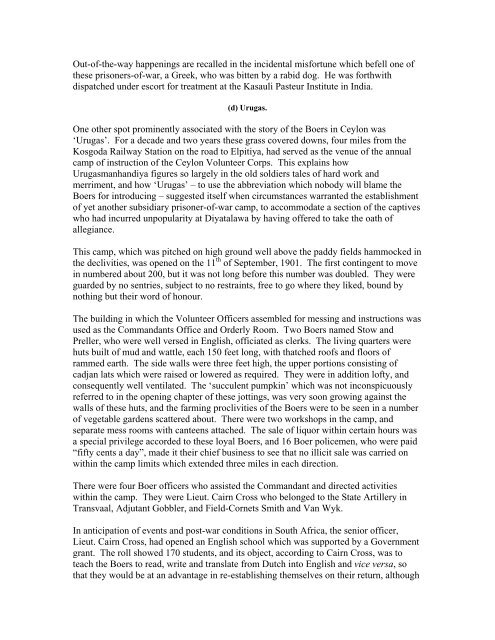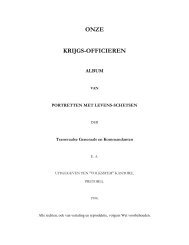Boere Krygsgevangenes in Ceylon - Boekmakierie.co.za
Boere Krygsgevangenes in Ceylon - Boekmakierie.co.za
Boere Krygsgevangenes in Ceylon - Boekmakierie.co.za
Create successful ePaper yourself
Turn your PDF publications into a flip-book with our unique Google optimized e-Paper software.
Out-of-the-way happen<strong>in</strong>gs are recalled <strong>in</strong> the <strong>in</strong>cidental misfortune which befell one of<br />
these prisoners-of-war, a Greek, who was bitten by a rabid dog. He was forthwith<br />
dispatched under es<strong>co</strong>rt for treatment at the Kasauli Pasteur Institute <strong>in</strong> India.<br />
(d) Urugas.<br />
One other spot prom<strong>in</strong>ently associated with the story of the Boers <strong>in</strong> <strong>Ceylon</strong> was<br />
‘Urugas’. For a decade and two years these grass <strong>co</strong>vered downs, four miles from the<br />
Kosgoda Railway Station on the road to Elpitiya, had served as the venue of the annual<br />
camp of <strong>in</strong>struction of the <strong>Ceylon</strong> Volunteer Corps. This expla<strong>in</strong>s how<br />
Urugasmanhandiya figures so largely <strong>in</strong> the old soldiers tales of hard work and<br />
merriment, and how ‘Urugas’ – to use the abbreviation which nobody will blame the<br />
Boers for <strong>in</strong>troduc<strong>in</strong>g – suggested itself when circumstances warranted the establishment<br />
of yet another subsidiary prisoner-of-war camp, to ac<strong>co</strong>mmodate a section of the captives<br />
who had <strong>in</strong>curred unpopularity at Diyatalawa by hav<strong>in</strong>g offered to take the oath of<br />
allegiance.<br />
This camp, which was pitched on high ground well above the paddy fields hammocked <strong>in</strong><br />
the declivities, was opened on the 11 th of September, 1901. The first <strong>co</strong>nt<strong>in</strong>gent to move<br />
<strong>in</strong> numbered about 200, but it was not long before this number was doubled. They were<br />
guarded by no sentries, subject to no restra<strong>in</strong>ts, free to go where they liked, bound by<br />
noth<strong>in</strong>g but their word of honour.<br />
The build<strong>in</strong>g <strong>in</strong> which the Volunteer Officers assembled for mess<strong>in</strong>g and <strong>in</strong>structions was<br />
used as the Commandants Office and Orderly Room. Two Boers named Stow and<br />
Preller, who were well versed <strong>in</strong> English, officiated as clerks. The liv<strong>in</strong>g quarters were<br />
huts built of mud and wattle, each 150 feet long, with thatched roofs and floors of<br />
rammed earth. The side walls were three feet high, the upper portions <strong>co</strong>nsist<strong>in</strong>g of<br />
cadjan lats which were raised or lowered as required. They were <strong>in</strong> addition lofty, and<br />
<strong>co</strong>nsequently well ventilated. The ‘succulent pumpk<strong>in</strong>’ which was not <strong>in</strong><strong>co</strong>nspicuously<br />
referred to <strong>in</strong> the open<strong>in</strong>g chapter of these jott<strong>in</strong>gs, was very soon grow<strong>in</strong>g aga<strong>in</strong>st the<br />
walls of these huts, and the farm<strong>in</strong>g proclivities of the Boers were to be seen <strong>in</strong> a number<br />
of vegetable gardens scattered about. There were two workshops <strong>in</strong> the camp, and<br />
separate mess rooms with canteens attached. The sale of liquor with<strong>in</strong> certa<strong>in</strong> hours was<br />
a special privilege ac<strong>co</strong>rded to these loyal Boers, and 16 Boer policemen, who were paid<br />
“fifty cents a day”, made it their chief bus<strong>in</strong>ess to see that no illicit sale was carried on<br />
with<strong>in</strong> the camp limits which extended three miles <strong>in</strong> each direction.<br />
There were four Boer officers who assisted the Commandant and directed activities<br />
with<strong>in</strong> the camp. They were Lieut. Cairn Cross who belonged to the State Artillery <strong>in</strong><br />
Transvaal, Adjutant Gobbler, and Field-Cornets Smith and Van Wyk.<br />
In anticipation of events and post-war <strong>co</strong>nditions <strong>in</strong> South Africa, the senior officer,<br />
Lieut. Cairn Cross, had opened an English school which was supported by a Government<br />
grant. The roll showed 170 students, and its object, ac<strong>co</strong>rd<strong>in</strong>g to Cairn Cross, was to<br />
teach the Boers to read, write and translate from Dutch <strong>in</strong>to English and vice versa, so<br />
that they would be at an advantage <strong>in</strong> re-establish<strong>in</strong>g themselves on their return, although





